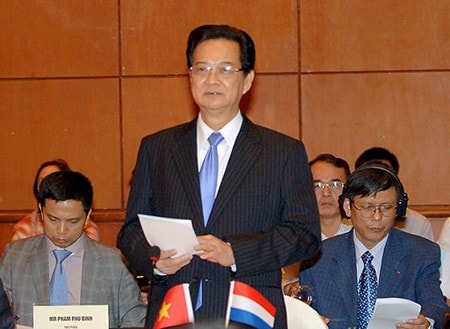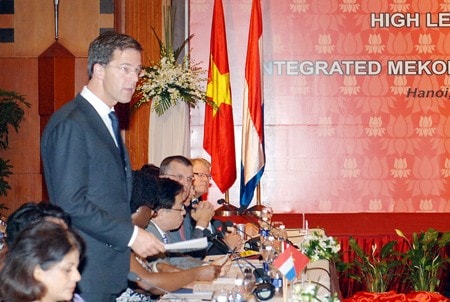Efforts to respond to climate change in the Mekong Delta
Prime Minister Nguyen Tan Dung highly appreciated and sincerely thanked the support of the Dutch Government and development partners for Vietnam in recent times; and called on the international community to continue supporting Vietnam's efforts to respond to climate change in general and in the Mekong Delta in particular..
 |
| Prime Minister Nguyen Tan Dung speaks at the Conference. Photo: VGP/Nhat Bac |
This morning (June 17), Prime Minister Nguyen Tan Dung and Dutch Prime Minister Mark Rutte co-chaired the High-Level Conference on coordination in supporting comprehensive development of the Mekong Delta.
Attending the conference were leaders of several central ministries and branches; World Bank Country Director in Vietnam Victoria Kwakwa; Asian Development Bank Country Director in Vietnam Tomoyuki Kimura; United Nations (UN) Resident Coordinator in Vietnam Pratibha Mehta; Ambassadors and representatives of several international organizations.
The Mekong Delta, with its high competitive advantage in agricultural economy, has contributed more than half of the national rice output, helping Vietnam to be among the top rice exporting countries in the world. This is also an area rich in biodiversity, a habitat and migratory stopover for many species of birds and fish, of great significance for the conservation of the world's biodiversity.
However, it can be said that never before has the Mekong Delta region faced as many challenges as it does today, including the negative impacts of climate change as well as the increasing pressure of socio-economic development that is not yet truly sustainable.
Therefore, this region is receiving special attention from both the Vietnamese Government and the international community with the aim of ensuring prosperous and sustainable development in the context of climate change adaptation.
Speaking at the conference, Prime Minister Nguyen Tan Dung stressed that the international community is increasingly concerned about the negative impacts of climate change. These are also huge challenges to Vietnam's socio-economic development as Vietnam is one of the countries that are and will be most severely affected by climate change.
Fully aware of these challenges, together with the efforts of the international community, the Government of Vietnam has directed and implemented the integration of climate change response activities into socio-economic development plans and schemes. Vietnam has gradually improved its institutions and implemented national strategies on natural disaster prevention and mitigation; climate change response; green growth; strengthening resource management and environmental protection and has established a National Steering Committee on Climate Change Response headed by the Prime Minister.
Expressing his delight at the recognition and support of the international community for Vietnam's efforts in the recent past, Prime Minister Nguyen Tan Dung stated that within the framework of the Strategic Partnership on Climate Change Adaptation and Management between the two countries, Vietnam highly appreciated the Netherlands' support for Vietnam in implementing the "Mekong Delta Plan" study. The study results, together with recommendations, are the basis for Vietnam to review and adjust the development orientation and plan of this strategically important region. Prime Minister Nguyen Tan Dung said that in fact, many socio-economic development programs and projects in the Mekong Delta are being supplemented and adjusted according to the basic orientation of these studies.
Prime Minister Nguyen Tan Dung announced five policies to respond to climate change and develop the socio-economy of the Mekong Delta region.
Accordingly, one is to maximize the potential and comparative advantages of localities in the region, promote economic restructuring, apply science and technology, and transform the growth model towards in-depth development associated with ensuring national food security. Focus on investing in a number of areas with comparative advantages; develop value chain models from production to consumption and export; form a diverse and flexible credit network...
Second, synchronously develop the system of urban areas, residential areas and technical infrastructure systems, social infrastructure in an environmentally friendly direction associated with fields, gardens, rivers and islands.
Third, closely combine economic development with development in the social fields, education and training, health care, culture, physical training and sports, associated with the implementation of social progress and equity, gradually improving the quality of life of the people; promoting hunger eradication, poverty reduction, reducing the gap in social development between regions and between ethnic groups in the region.
Fourth, sustainable development, linking socio-economic development with economical use of resources and protection of the ecological environment; having proactive solutions to prevent and respond to climate change and rising sea levels; closely combining socio-economic development with ensuring national defense and security, water security and food security.
Fifth, a comprehensive approach of inter-regional and inter-sectoral nature in socio-economic development of the entire Mekong Delta region, forming a synchronous coordination mechanism horizontally between localities and vertically between central and local agencies.
On behalf of the Vietnamese Government, Prime Minister Nguyen Tan Dung highly appreciated and sincerely thanked the support of the Dutch Government and development partners for Vietnam in recent times; Vietnam called on the international community to continue supporting Vietnam's efforts to respond to climate change in general and in the Mekong Delta region in particular.
Prime Minister Nguyen Tan Dung also affirmed that the Vietnamese Government always respects and effectively manages and uses ODA capital and pledges to create all favorable conditions and fully contribute its resources to effectively implement donors' support for the Mekong Delta region.
 |
| Dutch Prime Minister Mark Rutte speaks at the Conference. Photo: VGP/Nhat Bac |
Dutch Prime Minister Mark Rutte said that the Netherlands and the Mekong Delta region have many similarities, as they are both low-lying delta regions with high population density and similar areas. Both sides are also facing similar challenges, namely rising sea levels, changing water flows and salinity. That is why four years ago, Vietnam and the Netherlands decided to cooperate closely in this region. At the end of 2013, a long-term vision was set for the region, called the “Mekong Delta Plan”.
Emphasizing the call for joint efforts for a strong framework for development, the Dutch Prime Minister said that to succeed in a long-term plan such as the “Mekong Delta Plan” requires a clear strategy, with the right institutional and organizational perspectives. The Netherlands is ready to share its experience accumulated over thousands of years on water with other deltas and also wishes to learn from the experience of residents who have lived in other deltas for centuries.
“Learning from each other is how we can grow stronger and requires joint efforts from both sides. Together we can turn theory into action to fully exploit the potential of this region,” said Dutch Prime Minister Mark Rutte.
At the Conference, development partners also affirmed their long-term cooperation with Vietnamese authorities to support the comprehensive and sustainable development of the Mekong Delta; expressing confidence in a bright development future for this fertile delta.
According to.chinhphu.vn






